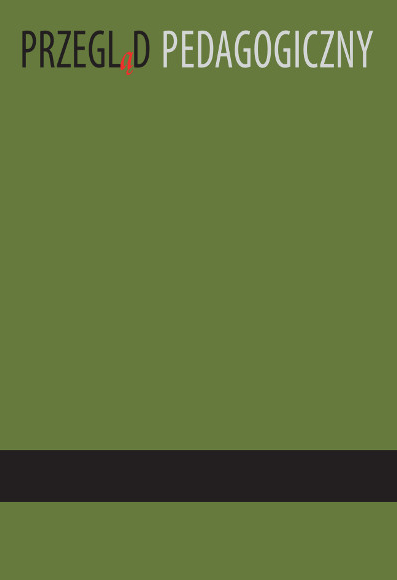Middle school teachers – looking for a new professional identity
DOI:
https://doi.org/10.34767/PP.2019.02.05Keywords:
transitions, professional teacher identity, temporary identities, change management strategiesAbstract
The liquidation of middle schools (gimnazjum) in Poland and their transformation into primary or secondary schools triggered a large-scale transition processes involving thousands of teachers in over six thousand schools. Particularly noteworthy are the schools where the teachers have undertaken to transform the former organization into a new type of school. What is unique about the process is that individual teacher transitions are closely linked with the transformation of the entire organization. This paper presents the results of qualitative empirical research conducted in order to analyze the process of teacher identity (re)construction that takes place in three interdependent processes: change of identity, learning processes and making things meaningful.
References
Barbour R. (2011). Badania fokusowe. Przeł. B. Komorowska. Warszawa: Wydawnictwo Naukowe PWN.
Bridges W. (2008). Zarządzanie zmianami. Jak maksymalnie skorzystać na procesach przejściowych. Przeł. R. Kotlicki. Kraków: Wydawnictwo Naukowe Uniwersytetu Jagiellońskiego.
Charmaz K. (2009). Teoria ugruntowana. Praktyczny przewodnik po analizie jakościowej. Przeł. B. Komornicka. Warszawa: Wydawnictwo Naukowe PWN.
Ecclestone K. (2009). Lost and found in transition: the implications of ‘identity’, ‘agency’ and ‘structure’ for educational goals and practices. W: J. Field, J. Gallacher, R. Ingram (eds.), Researching Transitions in Lifelong Learning. Routledge Taylor & Francis Group.
Erikson E.H. (2004). Tożsamość a cykl życia. Przeł. M. Żywicki. Poznań: Wydawnictwo Zysk.
Flick U. (2010). Projektowanie badania jakościowego. Przeł. P. Tomanek. Warszawa: Wydawnictwo Naukowe PWN.
Ibarra H. (1999). Provisional Selves: Experimenting with Image and Identity in Professional Adaptation. Administrative Science Quarterly 4(44), 764-791.
Kacperczyk A. (2016). Społeczne światy. Teoria – empiria – metody badań. Łódź: Wydawnictwo Naukowe Uniwersytetu Łódzkiego.
Kędzierska H. (2016). Noty terenowe – status, przetwarzanie i potencjał badawczy. Rocznik Andragogiczny, http://dx.doi.org/10.12775/RA.2016.017, s. 335-346.
Kowalczyk K. (2016). Nadawanie sensu, ustanawianie i badania Karla Weicka. W: K. Klincewicz (red.), Zarządzanie, organizacje i organizowanie – przegląd perspektyw teoretycznych. Warszawa: Wydawnictwo Naukowe Wydziału Zarządzania Uniwersytetu Warszawskiego.
Lam M.S., Pollard A. (2006). Conceptual framework for understanding children as agents in the transition from home to kindergarten. Early Years: Journal of International Research and Development 2(26), 123-141.
Rapley T. (2010). Analiza konwersacji, dyskursu i dokumentów. Przeł. Warszawa: Wydawnictwo Naukowe PWN.
Schlossberg N.K. (1981). A model for analyzing human adaptation to transition. Counselling Psychologist 9 (2), 2-18.
Weick K. (1995). Sensemaking in organisations. Thousand Oaks – London – New Delhi: Sage Publications.
Zahorska M. (2016). Nieznośna lekkość… reformowania oświaty. Studia z Polityki Publicznej, 2(10), 43-64.
Zittoun T. (2008). Learning through transitions: The role of institutions, European Journal of Psychology of Education 23, 165-181, https://doi.org/10.1007/BF03172743
Zittoun T. (2009). Dynamics of Life-Course Transitions: A Methodological Reflection. W: J. Valsiner, P. Molenaar, M. Lyra, N. Chaudhary (eds.), Dynamic Process Methodology in the Social and Developmental Sciences. New York: Springer.

